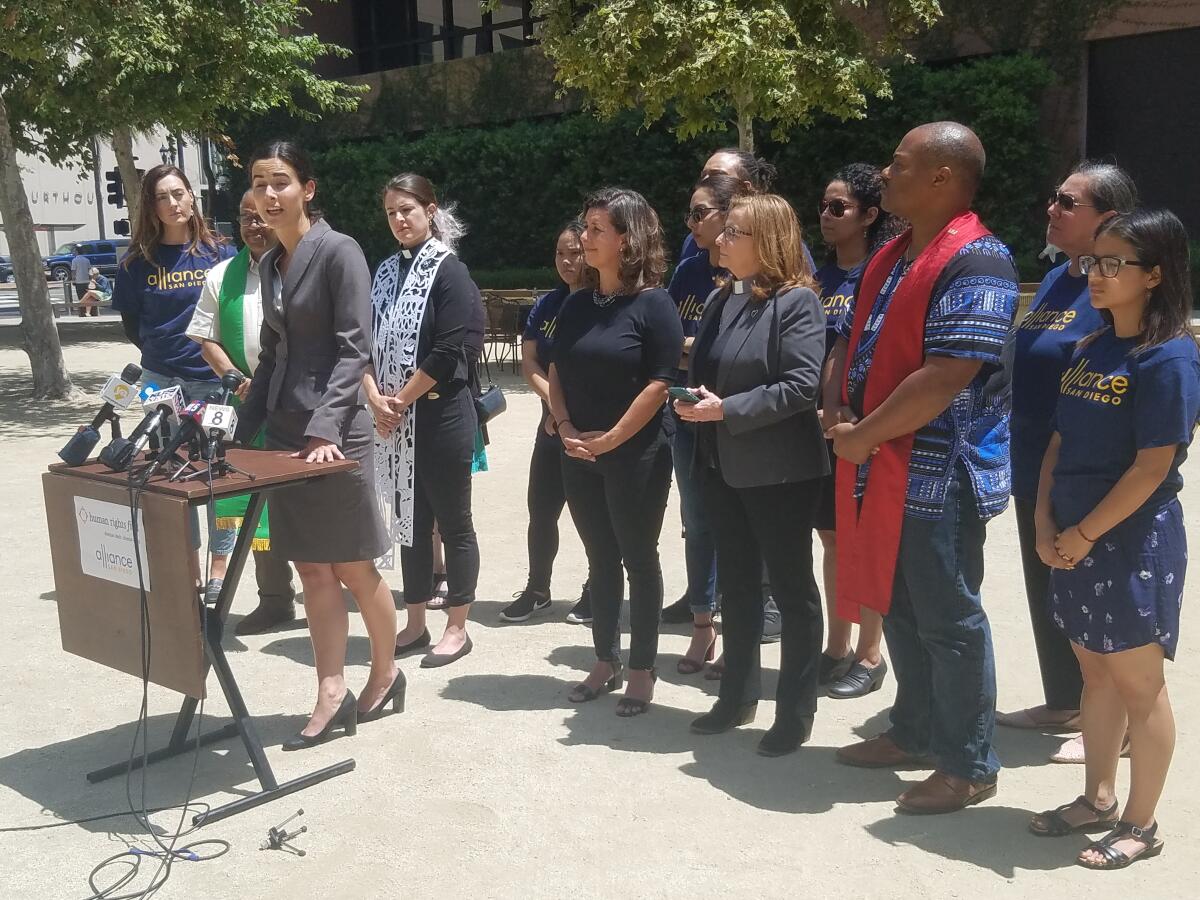Despite asylum win, migrant may be returned to Mexico again

- Share via
SAN DIEGO — For the first time, an immigration judge has granted asylum to a migrant who had been returned to Mexico under a Trump administration program.
But the Department of Homeland Security may send him back to Mexico anyway, said the lawyer representing the man.
The program, known officially as Migrant Protection Protocols and widely as “Remain in Mexico,” began sending certain asylum seekers back to Mexico in January to wait for their claims to be processed in immigration court.
According to recently released data from the Transactional Records Access Clearinghouse of Syracuse University, most court cases flagged as Migrant Protection Protcols are still pending. As of the end of June, no one in the program had won asylum.
Robyn Barnard, an attorney with the group Human Rights First, said she hasn’t heard from her client since he was taken into custody Tuesday afternoon after they had won his case.
He doesn’t have access to his phone while in custody. She believes that he is still being held at the San Ysidro Port of Entry.
DHS did not immediately respond to a request for comment.
Barnard’s client, a 30-year-old man from Honduras whom Human Rights First referred to by the nickname Alec for safety reasons, was granted asylum based on religious grounds. Alec was an Evangelical Christian leader in his community and was targeted and persecuted by the MS-13 gang, she said.
Through his work, he converted several gang members who decided to leave their violent lives behind, Barnard said. The gang killed them for leaving, she said, and went after Alec.
Judge Rico Bartolomei, an assistant chief immigration judge, found that the Honduran government is unable and unwilling to protect Alec from that persecution, Barnard said. For Central Americans fleeing gang violence, proving that element under asylum law is difficult but necessary to win protection.
Bartolomei also ordered that Alec be admitted to the United States.
Then, according to Barnard, the judge turned to the attorney representing DHS in the case and asked whether she wanted to consider appealing his decision. She said yes.
Bartolomei asked what would happen to Alec in the meantime.
The DHS attorney told Bartolomei that Alec would remain in DHS custody and “may be returned to Mexico,” Barnard said. If he does not return to Mexico, he could end up in an immigration detention center if DHS decides not to release him.
If the government decides to appeal the case to the Board of Immigration Appeals, the final decision could take years.
Bartolomei reiterated his order that Alec be allowed into the United States. He asked Barnard for her response.
Barnard said she gave a brief plea, emphasizing that Alec had followed U.S. law throughout the process, that he had already waited six months in Tijuana and that a local community member had already agreed to provide him housing. She promised to personally ensure that he follow any and all conditions put on him by DHS if he were released.
The DHS attorney said it wasn’t up to her, Barnard recalled. Alec would have to go back.
“He was very emotional,” Barnard said. “We had just had this wonderful moment of winning his protection after months of uncertainty. To say, ‘I don’t know what’s going to happen to you. They’re putting you back in that freezing cell,’ — he was very upset.”
“He’s been found to be a credible refugee and not a danger to the community,” Barnard added. “There’s no reason for him to have to be in that cell right now.”
Barnard said the government’s actions raise questions about the real reason for the Remain in Mexico program.
“It just seems that the purpose isn’t to ensure that only genuine refugees are coming in,” Barnard said. “The purpose is to make people give up — give up their claims and leave rather than wait for their day in court. What other reason is there at this point to send him back to Mexico after a judge has found that he is not lying, that he is a credible witness?”
She worried that if Alec is returned to Mexico after winning, it will cause even more asylum seekers to give up their cases.
“If they see this, if he gets returned, people are going to lose hope,” Barnard said.
Barnard was scheduled to present another Migrant Protection Protocols client’s case to a judge Wednesday afternoon for a decision on the person’s asylum claim. If Barnard wins again, that person could end up in the same position as Alec.
Morrissey writes for the San Diego Union-Tribune.
More to Read
Updates
6:04 p.m. Aug. 7, 2019: This story has been updated with information that Alec was released from custody on Wednesday afternoon.
Sign up for Essential California
The most important California stories and recommendations in your inbox every morning.
You may occasionally receive promotional content from the Los Angeles Times.














